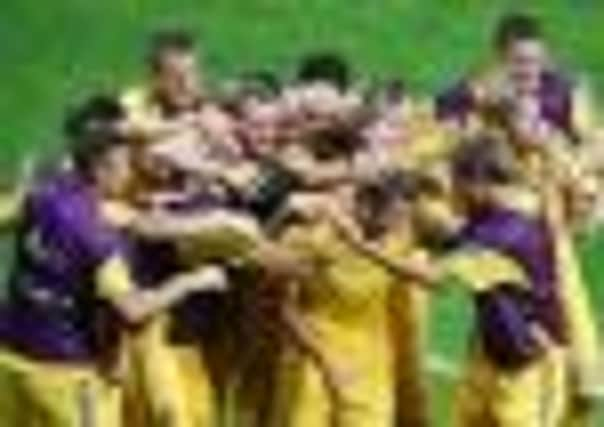Euro 2012: Blokhin must rally Ukraine


All the politics, all the allegations of racism, all the whispers that Ukraine would be dumped out in the group stage and should never have been awarded joint host status in the first place disappeared overnight in an outpouring of nationalistic fervour that had as much to do with sticking two fingers up at the country’s critics as it had with the highly-charged win over Sweden, especially given that none of the instances of racism so far being investigated by Uefa were perpetrated by Ukrainian fans.
But just as a week is a long time in politics, so it is in football. Along came France, turned the cheers into jeers and left the yellowmen clinging to the hope of beating Roy Hodgson’s England on Tuesday to prevent a humiliating exit. You kind of knew it would come down to this. Have no doubt, Blokhin’s team will be driven on by just about every emotion and endeavour known to man. England may need “only” a draw to knock out the hosts but every mis-timed tackle, every dubious refereeing decision will be greeted with ferocious, if perhaps desperate, hostility.
Advertisement
Hide AdAdvertisement
Hide AdTo understand why, you need only to look at the bad press Ukraine has endured in recent weeks. First there was that Panorama programme, highlighting the kind of homophobic and violent behaviour which, thankfully, left these shores over a generation ago but which is painfully evident in parts of eastern Europe. Then there was the Europe-wide condemnation of Ukraine’s human rights record and the decision by Britain and other countries to boycott the group phase over the “selective justice” meted out to jailed opposition leader Yulia Tymoshenko. Tymoshenko played a key role in the Orange Revolution in 2004 and her imprisonment, for alleged corruption, is widely viewed as an act of political revenge by Ukraine’s President Viktor Yanukovych. Jailed for seven years in October for abuse of power during her time as Prime Minister, Tymoshenko recently ended a 20-day hunger strike and is now being treated by a German doctor.
Even domestically, political infighting has threatened to overshadow the tournament. It seemed a light-hearted gesture at the time but a drinks bet between Ukrainian Prime Minister Mykola Azarov had with a Swedish fan has brought the wrath of the opposition down on him. If all this wasn’t enough, on the field Ukraine hardly had the air of a team pulling together for the common cause. Blokhin used no fewer than 41 players in 10 warm-up games as he sought a winning formula, leaving the local media in grave doubt about whether, when it came to the real thing, the great legend of Ukrainian football could get it right on the night as the man picking the team. We all know what unfolded. Against the Swedes, Ukraine played with enterprising width and dashing pace and penetration, defying the odds as Andrei Shevchenko’s glorious brace enhanced his national hero status.
Now, however, the mood is very different. Blokhin, who euphorically guided Ukraine to the 2006 World Cup quarter-finals, displayed signs of irritation in his post-match press conference after the 2-0 defeat by France, snapping at journalists who asked him how he would repair confidence in time for Tuesday’s decisive showdown with England. He admitted, however, to being disappointed by the way his players gave up the ghost after quick-fire goals from Jeremy Menez and Yohan Cabaye early in the second half. “I didn’t like the way that, after the second goal, my team stopped playing. We conceded the first goal from a counter-attack and everything went wrong from that moment.”
Yet long before the thunder clouds and torrential rain that dramatically suspended play for over an hour against the French in the same Donbass Arena in Donetsk where his team face England, the colourful Blokhin, 59, had warned of a “tornado that could throw us in an unknown direction.” Preparations had been hindered both by inter-squad bickering and serious blows – not least to their two first-choice keepers – and Blokhin, the first Ukrainian to win European Footballer of the Year in 1975, must now hope either than Shevchenko has another night to remember or the likes of Bayern Munich’s Anatoly Timoshuk, mercurial Dynamo Kiev playmaker Andrei Yarmolenko or the highly promising youngster Artem Milevskiy, a sub against the French, come good in their country’s 90 minutes of need.
England will hope that, if they can strike first, they can silence the crowd, a position not lost on Blokhin who has urged the public to get behind the team in adversity as well as in triumph. “It is not fair to only support your team when they play well,” he said. “You should support your team always. We have the impression that if we are winning everything is fine but, if we are losing, our supporters want to shoot us. Whistle at me, not the team.”
Get the picture? With empty gaps around many stadiums despite all tickets apparently having been sold, even Uefa are privately keen for Ukraine to get through to maintain the national interest and keep the momentum going.
History suggests otherwise. South Africa at the 2010 World Cup, Switzerland and Austria four years ago and Belgium in 2000 all failed to progress to the knockout stage. One suspects that trend will be continued on Tuesday, leaving a nation that has been given a footballing quick fix to be forced to return to the harsh realities of everyday life.